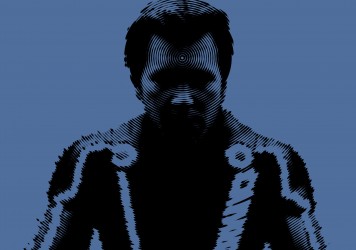The screen may glow in Joseph Kosinski’s sci-fi spectacle, but the soul lies cold.
A seductive opening sequence to Joseph Kosinski’s ambitious TRON sequel sees our hero Sam Flynn (Garrett Hedlund) weave his way down a freeway on a Ducati before he breaks into his father’s company and releases secret software onto the internet, just as ENCOM’s CEO is about to launch a grand trade announcement. The inference is clear – these days, the kids want it for free. Kevin Flynn (Jeff Bridges), for those unversed in the original, was a visionary programmer who became trapped in his own virtual creation, and the ‘We’re not in Kansas anymore’ moment arrives swiftly when Sam joins him.
Within minutes, Sam discovers his father’s hidden office and is launched from 2D reality into The Grid, a circuit board world of chromed cityscapes and charcoal skies streaked with pulsing light that morphs and stretches out of the screen towards you.
The ensuing action sequences are as impressive as they are prolonged. The camera swoops and dives in impossible curlicues as Sam tries to survive ‘the game’, while the first light cycle chase switches in the blink of an eye from one mutable platform to another. With jet-streams of electric colour coursing behind and igniting the screen, it is a truly remarkable use of 3D technology. When the narrative eventually kicks in it’s easy to sit back and expect some comment on our increasingly intimate relationship with technology. But TRON: Legacy declines to go down that route. Instead, it tries to bring eugenics back into fashion.
The Grid, in Kosinski’s telling, is a fascist state controlled by CLU, a computer program created in the image of Kevin Flynn. Flynn programmed CLU to remorselessly pursue perfection, and subsequently it destroys anything organic and raw. The world of TRON: Legacy is one where colour defines allegiance – tangerine-red for the authorities loyal to CLU; bleach-blue for the repressed underlings – the whole place is replete with Third Reich architecture and uniformed militaristic rallies.
This digital riff on Nietzsche isn’t new, as the remastered version of Fritz Lang’s Metropolis will attest, yet theme-park cinema like TRON: Legacy seems a little too comfortable with repackaging established images of genocide – like a stream of crocodiling refugees, or tumbling buildings full of people – to advance a narrative that revolves around killer games of ultimate frisbee, all set to the thumping beats of Daft Punk.
That is post-modernism at its most vapid.
Granted, this was never going to be an opus of profundity, but what really is inexcusable about TRON: Legacy is the android standard of performance. Garrett Hedlund performs the physical scenes well but fails comprehensively on the rare occasions when he’s required to convey empathy. Olivia Wilde, the love interest, has a lego bob and milk-white skin, but her role is largely reduced to fixing her giant sapphire eyes on Sam before Kosinski cuts away. Jeff Bridges, dressed like The Dude in a sauna, rhapsodises about uber-concepts with the credibility of a Goan hippie. Michael Sheen, obviously appreciating the depression of his surroundings, adds his impersonation of Ziggy Stardust, but is more like some awful hybrid of The Mad Hatter and Tony Blair.
It’s clear that Kosinski, a trained architect, has designs on the eyes rather than your mind. He has created a digital world of graphite and neon in which a lexicon of disparate ideas exists, but it’s difficult to compliment him for the overall direction of the film. TRON: Legacy undoubtably pushes at the aesthetics of cinema. It’s as dystopian as Blade Runner and as mystical as Avatar, but without James Cameron’s command of melodrama or Ridley Scott’s melding of thematics.
Published 16 Dec 2010
Five years of development and $300 million, all for this.
As immediate and immersive as a dream, but just as easily forgettable.
A wash of light, colour and sound that forgoes the most basic elements of cinema.

It’s the new technology that has hollywood’s top stars running scared, but will virtual actors ever take the place of the real thing?

Brad Bird’s sparkling sci-fi blockbuster is powered by big ideas and wide-eyed inquiry.

A weedy Crusier is dropped into a time-switching sci-fi set-up, with undeniably interesting results.